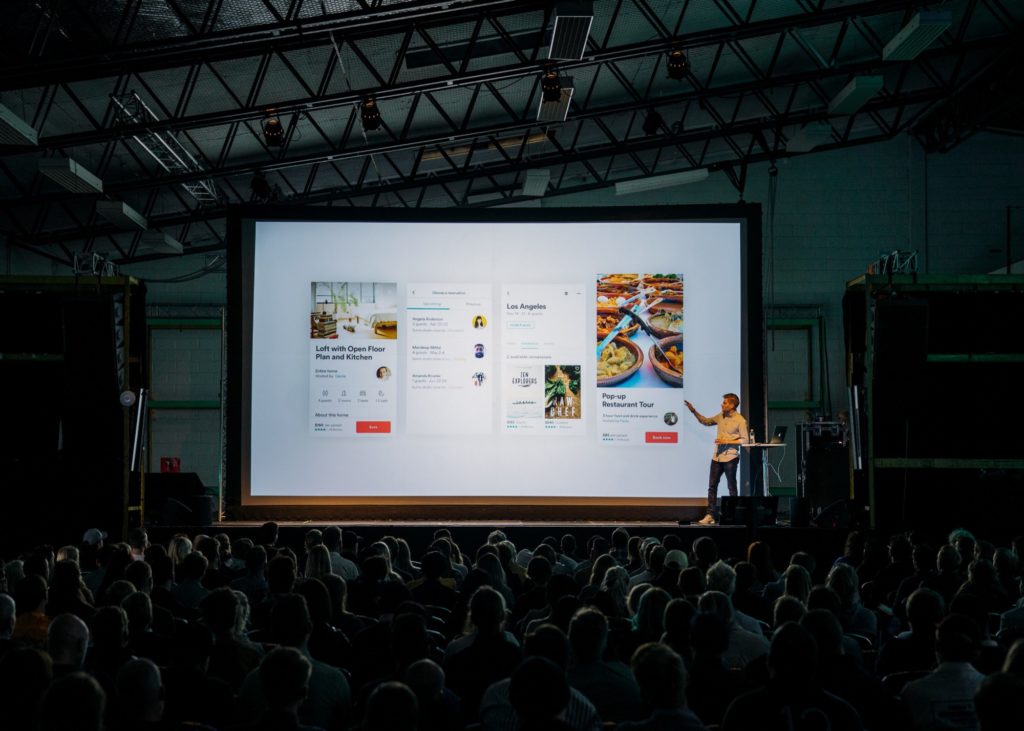Why “Document Everything” is Poor Advice
This is a guest post by our Entrepreneur in Residence Michael Boland (@michaelbolandco)
OFICINA HUB BLOG
***
A Developing Trend
I’m frequently approached by start-ups and entrepreneurs looking to build up their brands, create relevant content, and expand their networks. Oftentimes, these same people have Instagram, Facebook, and Twitter accounts for their businesses with no actual product or service in existence or on the horizon.
I’ve been guilty of this mindset too and find that we often get tied up in “building our brand” instead of proving our value to customers — a great customer experience is sometimes neglected altogether. I expect the fields of service and experience design to boom in the coming years as this problem persists.
This trend is something I like to call the “Gary Vee mistake”. Emerging as an extremely popular entrepreneur and now media guru among my generation, it is easy to get excited and inspired by Gary Vaynerchuk’s short videos, interviews, and advice clips. He is a hustler who spent much of his teens and 20s building successful businesses and brands.
He has spurred a new marketing fad with his famous mantra “document, don’t create”. Entrepreneurs everywhere are now filming their every move, photographing their logos all over cities, and publishing content at a borderline obsessive rate. Because of this new movement, I’ve heard entrepreneurs from all walks of life representing different industries offer the same advice: “document everything”.
But this article is not a hit-piece on the people following Gary Vee’s words and mass-producing content. It is rather an alternative perspective — one backed by collected start-up and business experiences from around the world: North and Central America, Western and Eastern Europe, North Africa, and most recently the Middle East.
In a 2012 Nielsen Report, data from 56 countries revealed that 92% of respondents trust “earned media”, such as recommendations from close friends and family ¹. This number has fluctuated between 88% and 92% in recent years ². Online consumer reviews were the next, most trusted media.
This is where I find the conundrum: I see entrepreneurs producing content before ever developing a viable product or a trusted user/customer base. I can’t recommend your product if I can’t find value in it or in your customer service — regardless of your brand’s “likes” on social.
Therefore, I’ve thought through a few of the main reasons I think constant content production is just bad advice (or at least very short-sighted). It’s a mixture of feelings and facts so please take what you will from it. Let’s begin!

Media Saturation
As the Gary Vee craze sweeps the globe, you better bet business owners and aspiring entrepreneurs are taking notes and joining the content bandwagon. Even on this platform, Medium, it can be difficult to determine if an article is a genuine piece of human creativity or a subtle, impish marketing ploy.
I predict that as brand content creation rises on social media, praised by the marketing and advertising realms, people will continue to turn to trusted reviews and family and friends for sound product/service advice and recommendations. When content ads are disguised as authentic articles, who can you trust?
Wouldn’t it be a shame to find out when you scroll down to my name that I work for ___ Media Company? It makes you question everything I am expressing in this article. Hopefully, it makes you question my intentions and motivations.
I think as the social media marketing trend grows, the companies that thrive will be those that engage in “deep relationships”, borrowing from the terminology of Cal Newport. In his book Deep Work, Newport defines deep work as uninterrupted work — the kind that sends us into a trance-like state ³. It is work that brings us true passion, fulfillment, and expertise. It also works that is missing in most of today’s companies.
Similarly, I think “deep relationships” are the future of business. A human-centered, trust-focused approach to product/service design and customer experience will win out in the long run. As constant noise bombards our senses to buy this product or rep that brand, we’ll continue to fall back on the companies that offer real human help, quality products, and genuine care for the best interests of their users.
Adding to this, companies that return to their roots and focus on building the best company culture while investing in and caring for their employees will reap the rewards of good work. Word of mouth is powerful and I’m more willing to buy your product if I know you treat your people right.
It is entirely possible for a brand to have a strong social media presence and bring real value to the lives of its customers. But what I’m seeing is a growing imbalance of priorities in which content production takes the wheel while value, trust, and genuine relationships are left to the wayside.

Unrealistic and Unhealthy Expectations
Just the idea of constantly documenting sounds like hell to me. Then again, I am that person who frequently considers deleting all of my social media accounts and taking a digital hiatus.
Let’s think about this logically. What happens when you promise constant content and documentation? Well, you set unreal expectations for your customer base and brand identity.
I’ve seen too many entrepreneurs who make this mistake burning out early, struggling to keep up with content creation. Their content quality eventually fades away and they resort to dirty tactics: accepting any and all content on their platform or copying/stealing content from other producers (often without credit or hyperlinks to the creators).
Furthermore, what happens if you ever decide you want to stop? How much of your customer base support you because of your content? How will they react to your decision? What I’m trying to say is, if you’re going to “document everything” and promise content, you better know your customers and be able to make true on that promise.
My suggestion? Only document what brings you joy. Share what you think is going to add value to and positively impact human lives. The world doesn’t need more static or disingenuous content. More than ever, it needs your realness, your passion, your humanity. However, I don’t think that it is effectively being fostered through media content (at least not in its current state).
Focus on developing strong bonds in your local community. Get to know the entrepreneurs and businesses working around you. Listen to people and try to find sustainable solutions to their real needs. Give back to your community. Planned obsolescence is not the future and you will be far ahead of the curve if you realize that today ⁴.
Documenting everything is also unhealthy. There is countless evidence to support the negative psychological, mental, and emotional health effects of constant social media use and content sharing ⁵. Instagram was recently noted as “the worst social media platform when it comes to its impact on young people’s mental health” ⁶. Maybe it is time to reconsider those implications…

The Commoditization of Humans
Humans are becoming brands in their own right. Many of us have personal brands, customized logos, and freelance websites that we use to market our work and skills to the world. While innocent on the surface and a way to be relevant and competitive in a globalized job market, there is a pernicious and dark side to this.
I call it the commoditization of humans. We are more and more becoming products, selling ourselves: our advantages, creativity, skills, experiences, etc all the time. We don’t need to have a personal brand to do this either. We do it every day when we post on social media. How often do we share the struggles, pain, and sadness that we feel in our lives? Rarely, if at all. Anything deemed less than happy is kept hidden while we project a perfectly fake representation of ourselves.
We’re always trying to show the best sides of ourselves, whether we use social media professionally or personally. From this fact alone, half of our humanity is already sterilized by the network. The other half we share is at best, a semi-accurate snapshot of our lives and at worst, a planned misrepresentation of our current realities.
Mix these warped sociodigital norms and behaviors with content marketing and the monetization of human networking and we’re left with a shallow culture of selfishness, paranoia, anxiety, and unhappiness.
We need to remember that the ability of humans to communicate with the world is still a new phenomenon. We’re still infants learning how to use this internet medium, making mistakes and abusing privileges along the way.
As of right now, the “Big Five” technology companies own and guard most of the data you share on the internet (Amazon, Apple, Google, Facebook, and Microsoft) ⁷. The power of these companies is raising a global red flag. Dishonest and manipulative tactics have already been leaked via documents from secret meetings while intrusive marketing practices are engineered based on the rich personal data people and businesses share through their platforms.
We have become the products. The products, services, and brands that you are promoting on social media can and will be used against you, to sell you the things these companies want you to buy, to show you the media and news they want to influence you, all in order to siphon as much data from you as possible ⁸. Where do you draw the line for privacy? Are the brand and marketing gains worth the intrusion and violation?

Dunbar’s Number
The human brain can only maintain a finite amount of human relationships at one time. This was first realized in the 1990s by anthropologists studying the brain sizes of primates and the average group size they lived within.
By using the average human brain size and extrapolating from the primate data, the scientists came to the conclusion that the human brain can manage between 100–250 simultaneous relationships, sitting comfortably at 150 ⁹.
I have close to 1,400 friends on Facebook. I recently created a business page to share some of my creative works and connect with others interested in collaborating or working on similar projects. I sent an invite to all ~1,400 friends to follow/like my page. As of today, I have 131 likes on the page. After scrolling through, these are all people I, at one time or another, had a close relationship or friendship with. This is Dunbar’s Number at work.
Dunbar’s Number is the same reason that historically, human tribes would lose stability and dissolve into separate factions. After 250, humans have extreme difficulty observing and keeping track of their relationships.
Under normal circumstances, egotistical individuals and those with malicious intent could be discovered within the tribe and punished. But when the tribe grows beyond its limits, bad actors are not as easily tracked, imbalances of power form and the tribe splits.
Personally, when I realized the significance of Dunbar’s Number, it released a tremendous weight from my shoulders – one that constantly nagged me to build, connect, network. I still do those things, but I am more aware of the process and selective in my decisions.
My point? It is not feasible to build such large networks and maintain them. Therefore, try to form authentic relationships with those in your vicinity wherever you may be. When you move on, do the same thing in the next place. But don’t try to force the growth of your brand, because the truth is you probably only really connect with 150 people casually and 4 to 6 people deeply at any given time ¹⁰.

A Giant Clusterf**k
It’d be an understatement to say that we have no idea what we’re doing. Most of us want to be successful (however we define that), make an “impact” (again, however, we define that), and have a fulfilling work-life ¹¹. Yet, I don’t see how that is possible when “document everything” and its other variations are the popular advice of the day.
I don’t just find this advice particularly useless, but see its staunch simplicity and general lack of awareness (of the emerging negative implications it has had in many avenues of human life – health, media/journalism, sustainable business practices, etc) as careless and harmful.
The culture of social media may be more toxic to individuals than it is helpful. This isn’t set in stone and can definitely change. But for now, the oligopoly running the show and the successful companies making big gains off your data is more than happy to persuade you to market yourself, document and publish content, and become dependent on their platforms for the success of your business.
By the same token, social media culture eliminates what truly makes us human in the shallow interactions, networks, and content that it fosters.
The human element is becoming increasingly uncommon in modern business practices and great customer experiences are becoming rare and surprising. Yet, we insist that more content, photos, and videos is the answer.

Looking Ahead
Having worked alongside businesses and startups around the world, helping humans find clarity, meaning, and true community, I am convinced that the way moving forward for entrepreneurship does not lie in documenting or publishing content, but in focused intentionality and relationship building.
Those who produce less (or no) content but put all their energy into providing the best service possible, unique and meaningful customer experiences, and strong, close-knit company culture will be the ones who flourish into the future.
When content is produced, those who record impactful moments and document genuine and unadulterated human experiences will be the ones who gain the continued trust and support of customers and communities.
As I mentioned in the beginning, the future is human-centered and trust-focused. Content obsession and social media overstimulation will only hasten the entry of this new paradigm (which is already upon us in many respects).
Until then, I’ll continue to observe the clusterf**k that is compulsive content production wherever I am, hopeful to help end the self-destructive tactics many entrepreneurs are using to promote themselves and their products.
Maybe it is just part of growing pains and learning how to use social media and communication networks. That is why I do think (and hope) that this is just a passing phase, a quick fad that wakes us up to what is and should be important in business: trust, relationship, community, and creating awesome things that will improve the lives of the people they reach.

